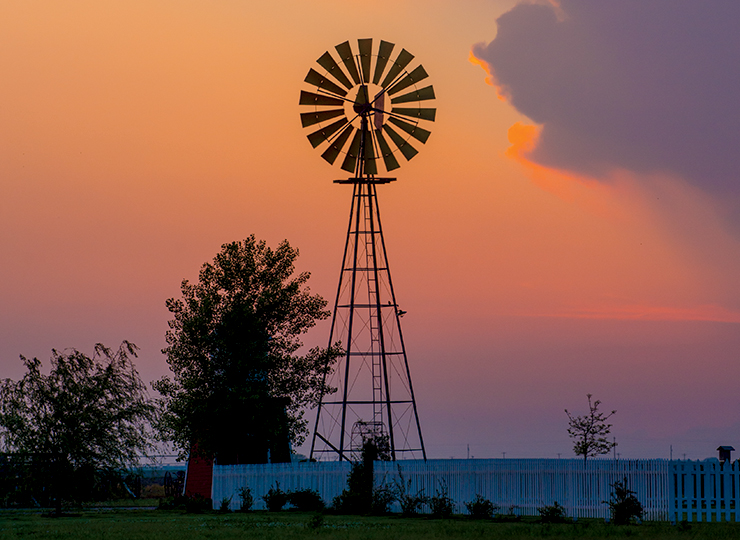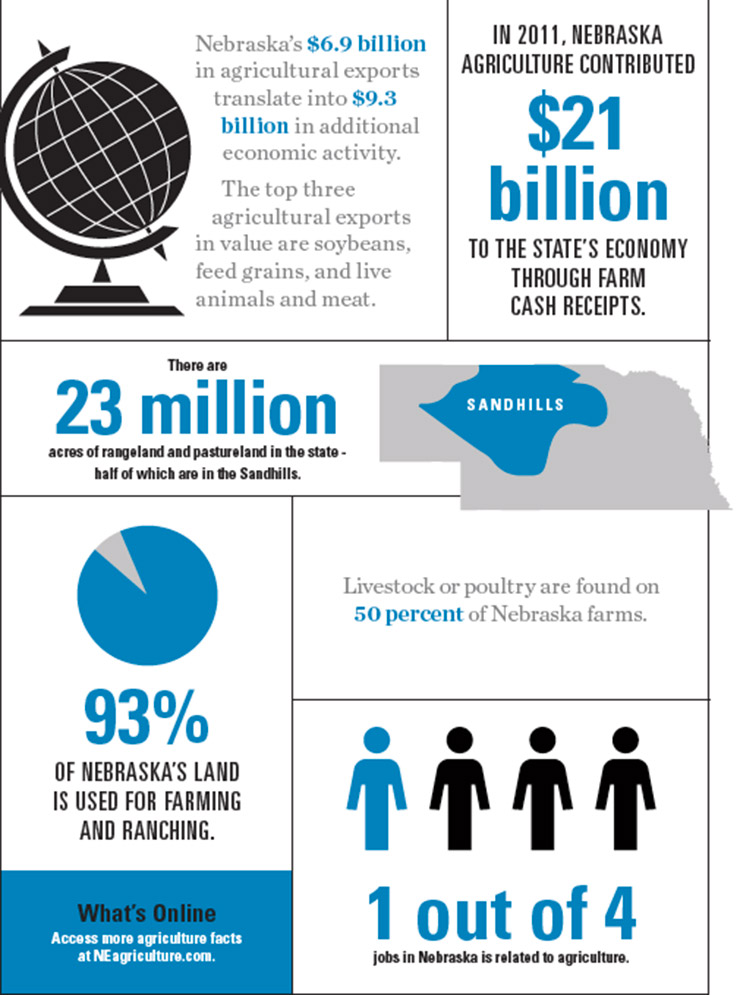Home > Nebraska > Nebraska Farm to Table > A Tradition of Agriculture in Nebraska
A Tradition of Agriculture in Nebraska

A decade ago, many of Nebraska’s hard-working citizens had little knowledge of how important the state’s agriculture industry is to its economy. But the economic recession that began in 2008 changed that.
While nearly every state in the nation reported record high unemployment rates and had to make devastating budget cuts, Nebraska was one of only two states that maintained a low unemployment rate, thanks in large part to its strong agricultural backbone. Nebraska’s agriculture industry, by and large, carried the Cornhusker State through the recession.
“The economic crisis pointed out how important agriculture is to Nebraska’s economy,” says Greg Ibach, director of the Nebraska Department of Agriculture. “Aside from that, agriculture is the basis for who we believe we are as Nebraskans. We are hard workers with ethics and integrity, and those values all stem from our agricultural roots.”
Roughly 93 percent of Nebraska’s land – a whopping 45.5 million acres – is used for agriculture. The state’s fertile valleys and expansive plains are home to 46,800 farms, making it a national leader in crop and livestock production. Nebraska ranks first in the nation for commercial red meat and Great Northern beans production; second in cattle and calves and pinto beans; third in corn for grain production; fifth in soybeans; and tenth in hay. Hogs, wheat, dairy, eggs and potatoes are also big business for Nebraska.
Agriculture Equals Jobs
But you don’t have to be a farmer or rancher to realize the benefits of agriculture. “Agriculture affects all of us, because it provides the food we eat, the fiber in the clothes we wear and the fuel we consume,” says Jason Henderson, vice president and Omaha Branch executive for the Federal Reserve Bank of Kansas City. “Agriculture benefitted Nebraska during the recession with stronger income gains and a strength in the industry that spurred jobs. Farmers bought more products, which spurred the manufacturing sector responsible for making tractors, combines, irrigation systems and buildings. Agriculture also supports the service sector, because farmers use accountants, lawyers and computer services.”
In fact, a study released in 2012 from the University of Nebraska-Lincoln (UNL) showed 25 percent of all jobs in Nebraska are related to agriculture.
“Agriculture really is a core to our economy – it’s one of the central pillars, whether people know it or not,” says Eric Thompson, author of the UNL study, which covered statistics from 2010. “We rely on agriculture for our employment and incomes, and that’s not true in many states. A whole cluster of industries have grown up to support farmers and ranchers, including transportation, manufacturing, sales and a large co-op sector with co-op operations across the state.”
The study also found that Nebraska’s “agricultural complex,” or the cluster of businesses that supply agriculture producers or process their goods (ethanol plants, grain processors, meat processing facilities and the like), contributed $68.88 billion, or 41 percent of the state’s total economy, in 2010.

The Changing Face of Agriculture
Advances in science and technology have been some of the biggest changes on farms and ranches across Nebraska in recent years. Gone are the images of overall-clad farmers holding pitchforks – today’s technology savvy farmers are more likely to be seen wearing Bluetooth earpieces and using GPS systems.
“Agriculture is one industry that has tapped global markets and evolved over time,” Henderson says. “The industry is not providing just food, but also alternative products. Corn is being used to make carpets, biodegradable plastics and ethanol.”
Nebraska ranks second in the nation for ethanol production, with 25 operating ethanol plants having production capacity of 2.25 billion gallons each year.
One of the biggest challenges farmers face is helping urban consumers realize they have a lot in common and depend on one another for their livelihood.
“People living in urban areas don’t always understand our way of life, but we’re really just like you,” Ibach says. “We work hard to meet consumers’ preferences and their expectations for healthy, affordable foods to feed our families. Our farmers and ranchers spend long hours in the fields to raise the food, fuel and fiber we all need. They care about and are involved in their local communities, but I also think they truly feel a responsibility to all citizens of the state.”




would like to talk to a farmer from nebraska